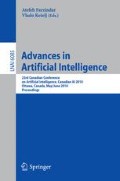Abstract
Given the breadth of constraint satisfaction problems (CSP) and the wide variety of CSP solvers, it is often very difficult to determine a priori which solving method is best suited to a problem. This work explores the use of machine learning to predict which solving method will be most effective for a given problem.
Access this chapter
Tax calculation will be finalised at checkout
Purchases are for personal use only
Preview
Unable to display preview. Download preview PDF.
References
Dechter, R., Meiri, I.: Experimental evaluation of preprocessing techniques in constraint satisfaction problems. In: Proceedings of the Eleventh International Joint Conference on Artificial Intelligence, vol. 1, pp. 271–277 (1989)
Elkan, C.: The foundations of cost-sensitive learning. In: International Joint Conference on Artificial Intelligence, vol. 17, pp. 973–978 (2001)
Epstein, S., Wallace, R., Freuder, E., Li, X.: Learning Propagation Policies. In: Proceedings of the Second International Workshop on Constraint Propagation And Implementation, pp. 1–15 (2005)
Frost, D., Dechter, R.: Look-ahead value ordering for constraint satisfaction problems. In: International Joint Conference on Artificial Intelligence, vol. 14, pp. 572–578 (1995)
Gent, I., MacIntyre, E., Prosser, P., Walsh, T.: The constrainedness of search. In: Proceedings of the National Conference on Artificial Intelligence, pp. 246–252 (1996)
Haralick, R., Elliott, G.: Increasing tree search efficiency for constraint satisfaction problems. Artificial intelligence 14(3), 263–313 (1980)
Petrovic, S., Epstein, S.: Random Subsets Support Learning a Mixture of Heuristics. International Journal on Artificial Intelligence Tools 17(3), 501–520 (2008)
Quinlan, J.: C4. 5: programs for machine learning. Morgan Kaufmann, San Francisco (1993)
Xu, L., Hutter, F., Hoos, H., Leyton-Brown, K.: SATzilla: portfolio-based algorithm selection for SAT. Journal of Artificial Intelligence Research 32(1), 565–606 (2008)
Author information
Authors and Affiliations
Editor information
Editors and Affiliations
Rights and permissions
Copyright information
© 2010 Springer-Verlag Berlin Heidelberg
About this paper
Cite this paper
Thompson, C.D.S. (2010). Predicting Optimal Constraint Satisfaction Methods. In: Farzindar, A., Kešelj, V. (eds) Advances in Artificial Intelligence. Canadian AI 2010. Lecture Notes in Computer Science(), vol 6085. Springer, Berlin, Heidelberg. https://doi.org/10.1007/978-3-642-13059-5_56
Download citation
DOI: https://doi.org/10.1007/978-3-642-13059-5_56
Publisher Name: Springer, Berlin, Heidelberg
Print ISBN: 978-3-642-13058-8
Online ISBN: 978-3-642-13059-5
eBook Packages: Computer ScienceComputer Science (R0)

